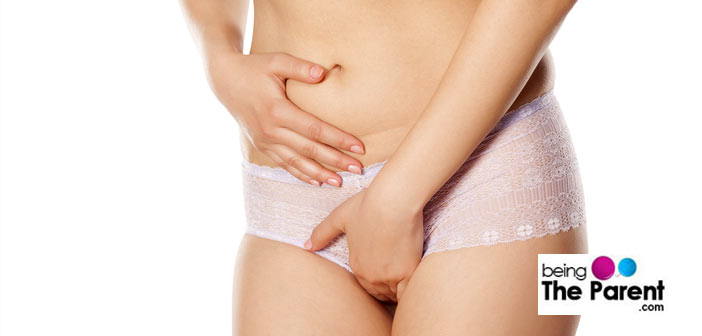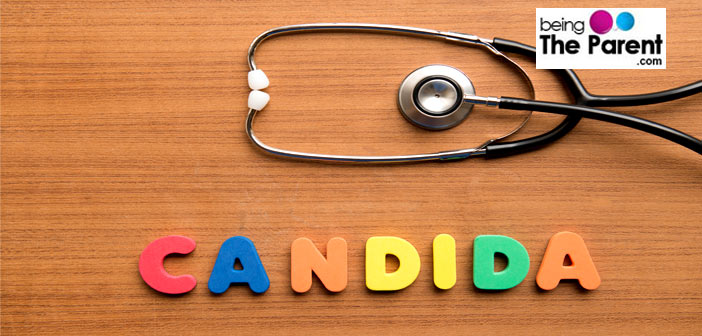
Treating Yeast Infection And Candida During Pregnancy
3 min readWritten by Editorial Team

Vaginal thrush is due to infection with a yeast-like fungus, Candida albicans, which thrives in warm, moist places. It lives happily in or on the body of most of the population, usually without causing harm. When it overgrows, however, it can produce vaginal soreness, itching and a discharge like cottage cheese. Thrush is especially common during pregnancy, when hormonal changes, mostly estrogen, render the sugar content of vaginal cells higher than normal. Recurrent thrush may be linked with lack of iron needed by white blood cells to help fight fungal infections.

Will Vaginal Thrush During Pregnancy Harm My Baby?
No such indications have been noted. However, if you have the infection during the birth process there are chances that your baby may contract the same.
Treating Yeast And Candida Infections During Pregnancy
If you have the infection, do not buy anti-thrush medications from the local drug store. Oral medications for vaginal thrush are generally not prescribed during pregnancy. However, you may be prescribed an anti-thrush pessary, for about 7 days. Insert the same with your hand rather than using the applicator as chances of injuring your cervix will be less. Some other options are:
- Aromatherapy: After the first 16 weeks of pregnancy, you can add two drops each of bergamot, lavender and geranium essential oils to 30 ml carrier oil and add this to your bath water. Lie in the water and soak for 20 minutes. You can also add two drops of any of these anti fungal oils to a little vitamin E cream, five ‘bio’ yogurt or KY (or a similar) jelly and apply to the vulval area. Use as often as necessary to help relieve symptoms, especially itching. Homeopathy (take six times a day for up to five days), as follows:
- for vaginal Candida with a milky, itchy discharge, especially if linked with premenstrual headache, stress, overwork or pregnancy, take Calcarea car-bonica
- for vaginal Candida with an offensive discharge that is worse after making love take Sepia
- for vaginal Candida with burning pains, especially if linked with stress or another illness (e.g. for which antibiotics were taken), take Sulphur
- for a copious, irritant, itchy discharge take Helonias
- for Candida unresponsive to treatment take Candida albicans
- Naturopathy: many cases of vaginal thrush are finked with low levels of friendly bacteria (Lactobacillus acidophilus) in the vagina and bowel. Eating live ‘bio’ yogurt daily can help to restore bacterial balance and reduce the likeli¬hood of recurrent thrush symptoms. In addition, you may also benefit from a yoghurt-like liquid supplement (Yakult) containing a culture of Lactobacillus casei Shirota. Sup¬plements are also available in health food shops containing Lactobacillus acidophilus, Lactobacillus bulgaricus and related species such as Bifidobacterium bifidum and Bifid¬obacterium longum. These can be taken in powder or cap¬sule form, or used to make your own yoghurt cultures. Probiotic fruit juices fortified with Lactobacilli are also available in some areas (ProViva)
- Crystal therapy: Carry a carnelian with you at all times
- Other complementary therapies Other complementary therapies that can help include cym¬atics, healing, reiki and reflexology

How Can I Prevent Vaginal Thrush In Pregnancy?
The below listed simple tips can help you avoid contracting a vaginal thrush during pregnancy:
- Increase your intake of dietary iron (e.g. seafood, red meat, poultry, nuts, whole grains and green leafy vegetables), and vitamin C (e.g. citrus fruit, berry fruits and kiwi fruit), which boosts absorption of iron from the gut
- Wear cotton or silk panties and avoid the synthetic ones
- A good vitamin and mineral supplement designed for pregnancy that includes iron is also a good idea
- Avoid tight underwear, especially nylon pantyhose or tight trousers
- Avoid getting hot and sweaty—use panty-liners and change them frequently
- Boil your cotton underwear or hot-iron the gussets, as modern low temperature (40 °C/104° F) washing machine cycles do not kill Candida spores and recurrent thrush may be due to reinfection from your underclothes
- Avoid sugar in your diet—use the natural sweeteners like Stevia instead
- Try to avoid stress—make time for regular exercise, rest and relaxation
- Avoid bath additives and vaginal deodorants, which upset your natural acid and bacterial balance
- Ask your partner to use an anti fungal cream as men can harbor yeasts without developing symptoms, so they keep passing spores back when making love
- Always wipe yourself from front to back, and never the other way round

Editorial Team,
With a rich experience in pregnancy and parenting, our team of experts create insightful, well-curated, and easy-to-read content for our to-be-parents and parents at all stages of parenting.Read more.
Responses (0)
Want curated content sharply tailored for your exact stage of parenting?
Related articles

Estimated Fetal Weight(EFW) in Pregnancy – What is it, How to Calculate and Steps to Improve

Belly Expansion During Pregnancy – A Trimester Wise Guide

Enema During Labor – Is it Recommended or Not?

Psychological Care During Pregnancy

Top 8 Third Trimester Essentials During Pregnancy

Curd During Pregnancy – Is it Safe to Have and Top Benefits
Sponsored content
Discover great local businesses around you for your kids.
Get regular updates, great recommendations and other right stuff at the right time.





